Related Research Articles

Larry Graham Jr. is an American bassist and baritone singer, with the psychedelic soul/funk band Sly and the Family Stone and as the founder and frontman of Graham Central Station. In 1980, he released the single "One in a Million You", which reached the top ten on the US Billboard Hot 100. He is credited with the invention of the slapping technique on the electric bass guitar, which radically expanded the tonal palette of the bass, although he himself refers to the technique as "thumpin' and pluckin'".

John Brumwell Mayall was an English blues and rock musician, songwriter and producer. In the 1960s, he formed John Mayall & the Bluesbreakers, a band that has counted among its members some of the most famous blues and blues rock musicians. A singer, guitarist, harmonica player, and keyboardist, he had a career that spanned nearly seven decades, remaining an active musician until his death aged 90. Mayall has often been referred to as the "godfather of the British blues", and was inducted into the Rock and Roll Hall of Fame in the musical influence category in 2024.

Sly and the Family Stone was an American funk band formed in San Francisco, California in 1966 and active until 1983. They are considered to be pivotal in the development of funk, soul, R&B, rock, and psychedelic music. Their core line-up was led by singer-songwriter, record producer, and multi-instrumentalist Sly Stone, and included Stone's brother and singer/guitarist Freddie Stone, sister and singer/keyboardist Rose Stone, trumpeter Cynthia Robinson, drummer Greg Errico, saxophonist Jerry Martini, and bassist Larry Graham. The band was the first major American rock group to have a racially integrated, mixed-gender lineup.

Sylvester Stewart, better known by his stage name Sly Stone, is an American musician, songwriter, and record producer who is most famous for his role as frontman for Sly and the Family Stone, playing a critical role in the development of funk with his pioneering fusion of soul, rock, psychedelia and gospel in the 1960s and 1970s. AllMusic stated that "James Brown may have invented funk, but Sly Stone perfected it," and credited him with "creating a series of euphoric yet politically charged records that proved a massive influence on artists of all musical and cultural backgrounds." Crawdaddy! has credited him as the founder of the "progressive soul" movement.

John Symon Asher Bruce was a Scottish musician. He gained popularity as the primary lead vocalist and bassist of rock band Cream. After the group disbanded in 1968, he pursued a solo career and also played with several bands.

Slapping and popping are ways to produce percussive sounds on a stringed instrument. They are primarily used on the double bass or bass guitar. Slapping on bass guitar involves using the edge of one's knuckle, where it is particularly bony, to quickly strike the string against the fretboard. On bass guitars, this is commonly done with the thumb, while on double bass, the edge of the hand or index finger may be used. Popping refers to pulling the string away from the fretboard and quickly releasing it so it snaps back against the fretboard. On bass guitar, the two techniques are commonly used together in alternation, though either may be used separately.

Graham Central Station was an American funk band named after founder Larry Graham. The name is a pun on New York City's Grand Central Terminal, often colloquially called Grand Central Station.
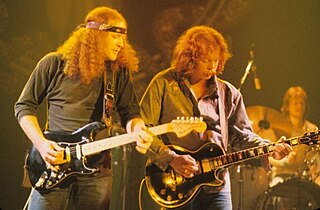
Outlaws is an American Southern rock band from Tampa, Florida. They are best known for their 1975 hit "There Goes Another Love Song" and extended guitar jam "Green Grass and High Tides" from their 1975 debut album, plus their 1980 cover of the Stan Jones classic "(Ghost) Riders in the Sky".

"Everyday People" is a 1968 song composed by Sly Stone and first recorded by his band, Sly and the Family Stone. It was the first single by the band to go to number one on the Soul singles chart and the U.S. Billboard Hot 100 chart. It held that position on the Hot 100 for four weeks, from February 9 to March 8, 1969, and is remembered as one of the most popular songs of the 1960s. Billboard ranked it as the No. 5 song of 1969.
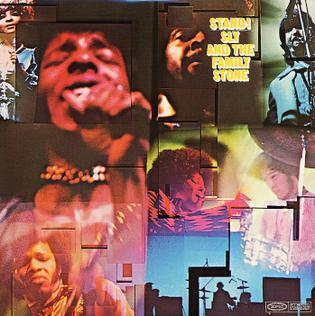
Stand! is the fourth album by soul/funk band Sly and the Family Stone, released in April 1969. Written and produced by lead singer and multi-instrumentalist Sly Stone, Stand! is considered an artistic high-point of the band's career. Released by Epic Records, just before the group's celebrated performance at the Woodstock festival, it became the band's most commercially successful album to date. It includes several well-known songs, among them hit singles, such as "Sing a Simple Song", "I Want to Take You Higher", "Stand!", and "Everyday People". The album was reissued in 1990 on compact disc and vinyl, and again in 2007 as a remastered numbered edition digipack CD with bonus tracks and, in the UK, as only a CD with bonus tracks.

Dance to the Music is the second studio album by funk/soul band Sly and the Family Stone, released in 1968 on Epic/CBS Records. It contains the Top Ten hit single of the same name, which was influential in the formation and popularization of the musical subgenre of psychedelic soul and helped lay the groundwork for the development of funk music.
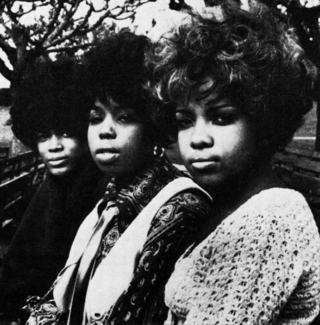
Little Sister was an American all-female vocal harmony group, which served primarily as the background vocalists for the influential rock/funk band Sly and the Family Stone in concert and on record. Originally a gospel music group called the Heavenly Tones, Little Sister was composed of Vet Stewart, Mary McCreary, and Elva Mouton, and became a recording act of its own for a brief period in 1970–1971.
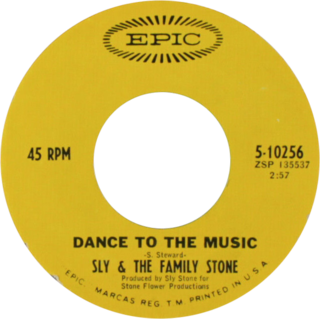
"Dance to the Music" is a 1967 hit single by soul/funk/rock band Sly and the Family Stone for the Epic/CBS Records label. It was the first single by the band to reach the Billboard Pop Singles Top 10, peaking at #8 and the first to popularize the band's sound, which would be emulated throughout the black music industry and dubbed "psychedelic soul". It was later ranked #223 on Rolling Stone's list of the 500 Greatest Songs of All Time.
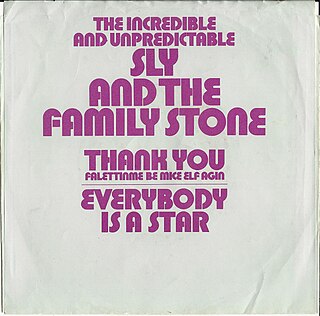
"Thank You (Falettinme Be Mice Elf Agin)" is a 1969 song recorded by Sly and the Family Stone. The song, released as a double A-side single with "Everybody Is a Star", reached number one on the soul single charts for five weeks, and reached number one on the Billboard Hot 100 in February 1970. Billboard ranked the record as the No. 19 song of 1970.

High on You is the first solo album by singer/songwriter/multi-instrumentalist Sly Stone, released by Epic/CBS Records in 1975. The Family Stone broke up in January 1975 after a disastrous booking at the Radio City Music Hall. At this point, the band members parted company with Stone, except for trumpeter Cynthia Robinson, his brother guitarist Freddie Stone, and backup singers Little Sister. With subsequent recordings, Stone returned to using the name of his former band, although they were largely solo recordings.

Audley Freed is a guitarist from Burgaw, North Carolina.

"If You Want Me to Stay" is a 1973 hit single by Sly and the Family Stone, from their album Fresh.

Randy Resnick is an American guitarist, songwriter and saxophonist who has played with many prominent blues and jazz musicians, such as Don "Sugarcane" Harris, John Lee Hooker, John Mayall, Canned Heat and Freddie King. He was developing both one- and two-handed tapping style in the early 1970s. He published a CD of his own music in 1995, "To Love" under the name Randy Rare. There is an example of his tapping work in the recording from that CD below. In 2020, he began publishing new music, much of it on saxophone, on the streaming platforms like Spotify, Tidal (service) and iTunes under his own Each Hit label.

Harvey "The Snake" Mandel is an American guitarist best known as a member of Canned Heat. He also played with Charlie Musselwhite and John Mayall as well as maintaining a solo career.
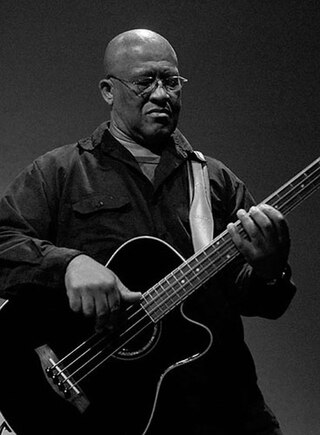
Henry Oden is an American blues musician from California.
References
- ↑ Selvin, Joel (1998). For the Record: Sly and the Family Stone: An Oral History. New York: Quill Publishing. ISBN 0-380-79377-6. pp. 154.
- ↑ Jisi, Chris (2006). "Rustee Allen’s Complete Bass Line: Sly & The Family Stone's 'If You Want Me To Stay'". Bass Player. Digital version retrieved April 19, 2007.
- ↑ Okayplayer.com - New Sly Stone Documentary Premiering In January 2017 By Elijah C. Watson